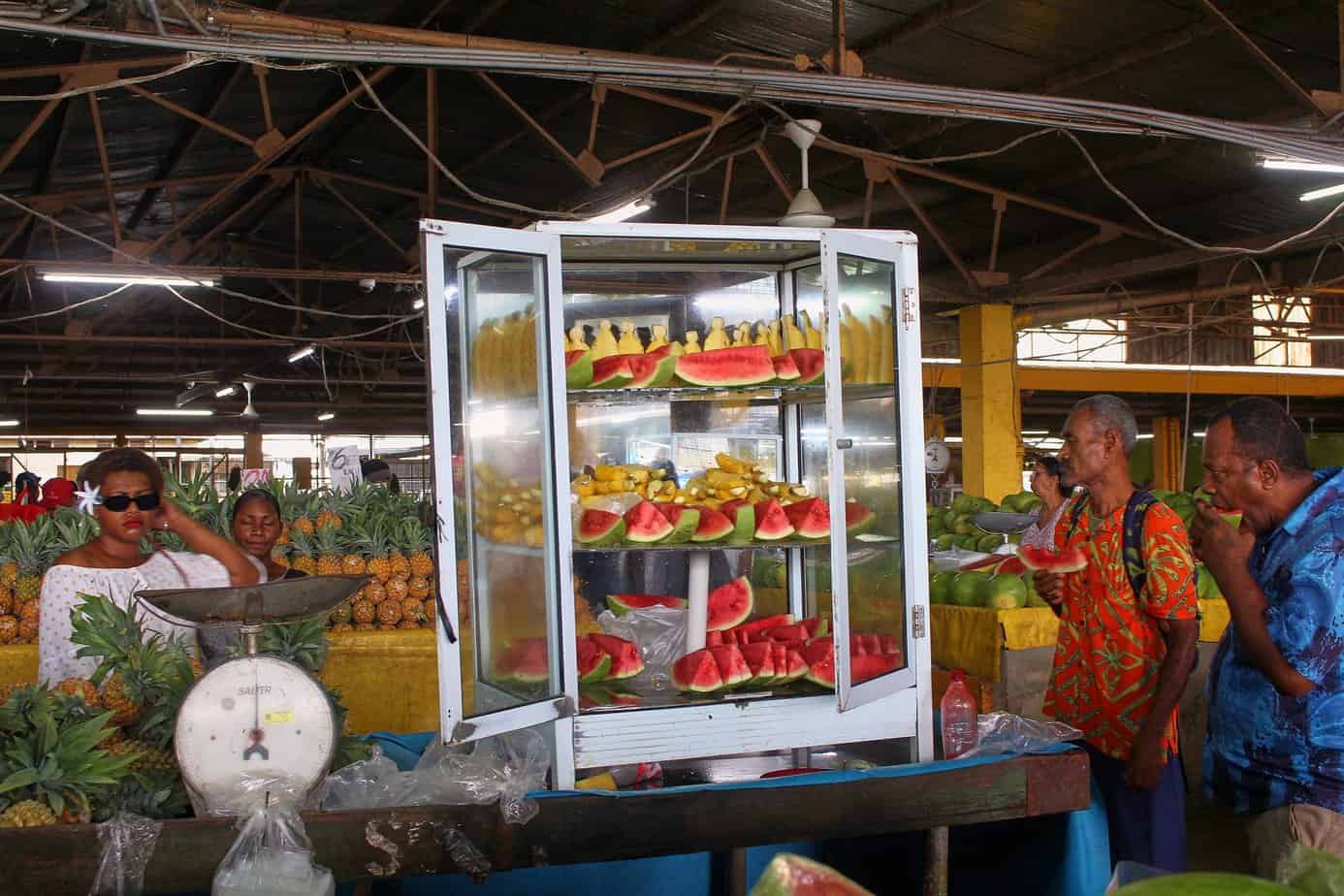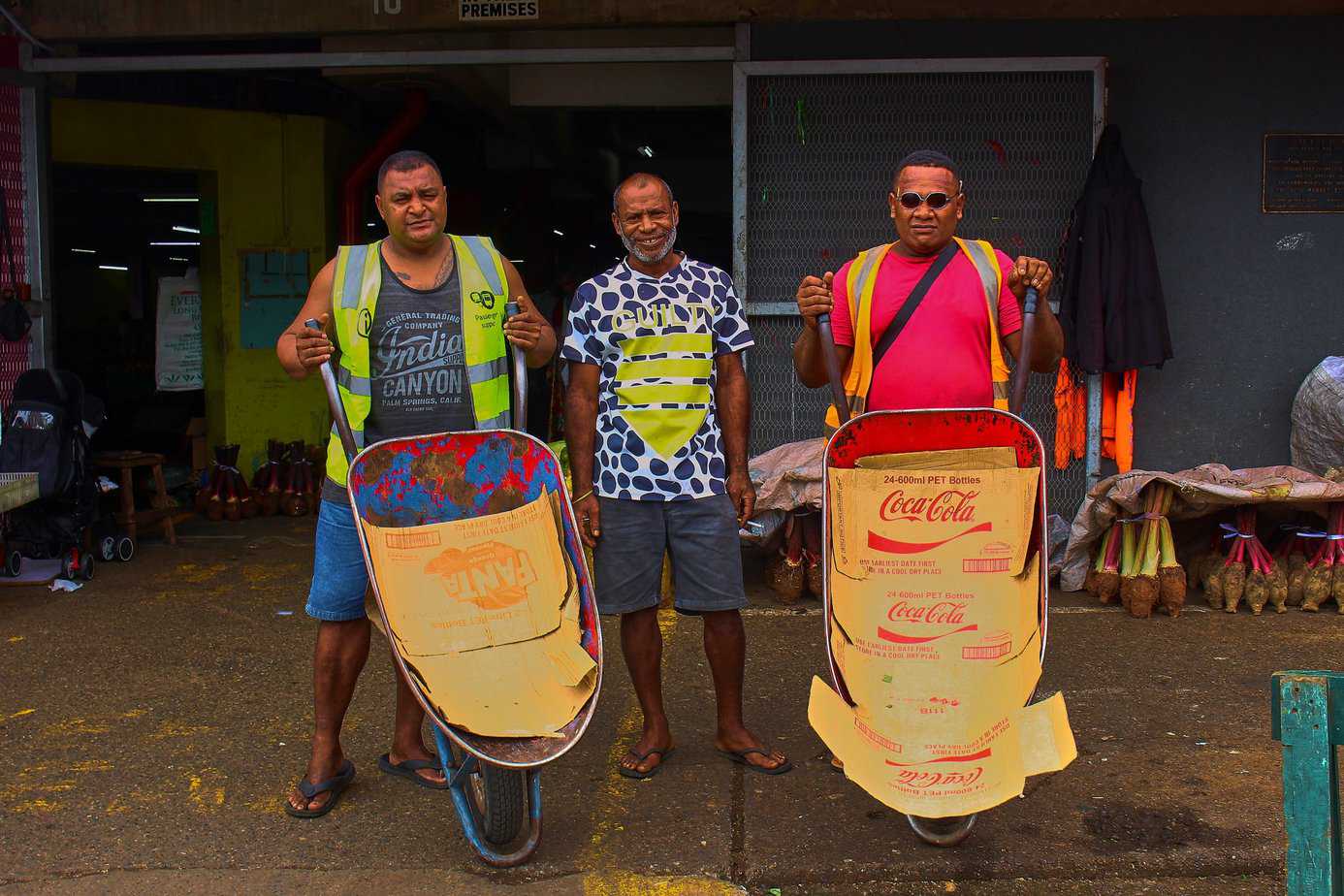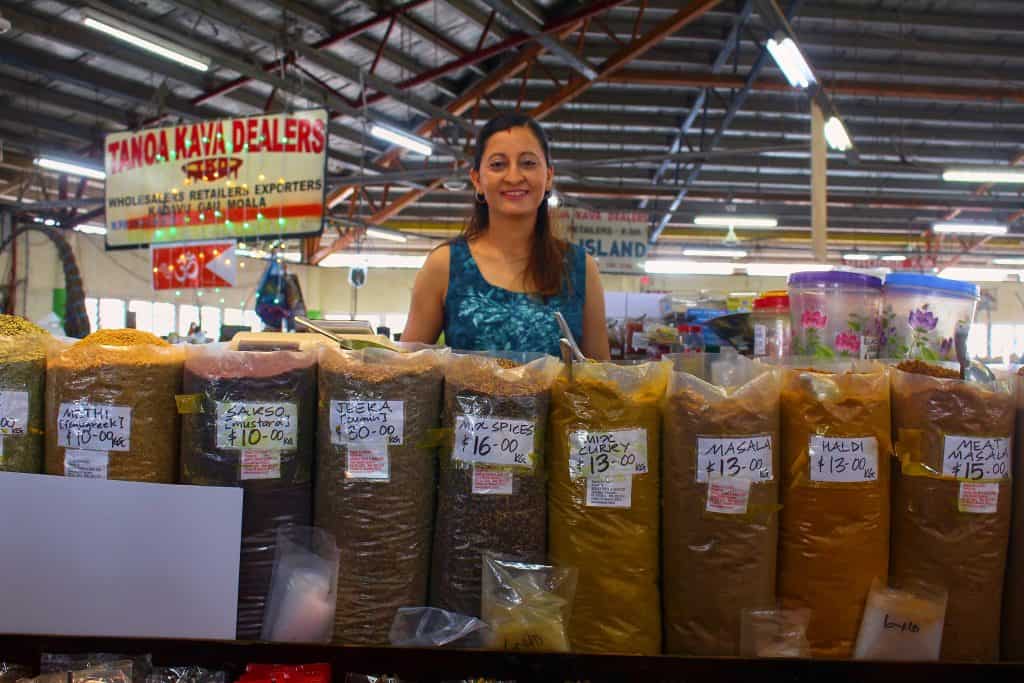By Vittoria Pasca
One of the highlights of a trip to Suva is the tour of its central market, where you’ll be able to enjoy some local goodies, have a chat with the vendors and get an authentic experience of everyday life in Fiji’s capital.
The market is located a walking distance from Suva’s main attractions and hotels. It’s one of the biggest vegetable markets in the South Pacific, both in terms of size and product variety.
Suva is a multicultural city and so is its market: here you’ll find not only traditional foods like coconut products, tropical fruits, crops and kava, but also some ingredients typical of Indian cuisine (from jackfruit and long beans to spices, pulses and grains), as well as Chinese foods like fresh tofu, choy sum, bok choy or watercress.
But let’s start our tour by checking out the flower section.
The flower corner
One of the most colourful and beautiful areas of the market is the flower corner, where you’ll find a large variety of lush tropical flowers. Pick your favourite from orchids, birds of paradise, ginger flowers or a bouquet – it will cost you only a few dollars.
The ladies here are very charming, always happy to have a chat with their customers. Nina, who sells both loose flowers and fancy bouquets she arranges herself, is happy the area was recently renovated: “Look how clean and beautiful the new space is!” She comes every day from Kinoya, where she has a house with a small garden. “I like gardening and I grow some of these flowers myself. But my quantities alone wouldn’t be sufficient, so I also have suppliers from the highlands – mainly Tailevu and Naitasiri”.
It is hard to leave without buying some flowers for yourself, but before entering the market, don’t forget to get some refreshing bu (coconut water). The vendors will happily open the coconut for you – and their impressive knife skills are a pleasure to watch!
Going undercover
Now it’s time to enter the undercover area to admire the beautiful shapes and colours of Fiji’s produce. Feel free ask questions if you find some exotic products you’re not familiar with, the vendors are generally very welcoming and happy to explain how the different vegetables should be prepared.
A few steps further and you will find Chinese stalls selling fresh tofu, generally the silken or hard varieties, and occasionally tofu skin.
You’ll also notice some stalls selling massive jackfruits that the skilful vendors clean and cut into smaller pieces for us. When in season, you’ll also see a delicacy, Fiji’s duruka, often called Fijian asparagus, due to its shape which recalls that of white asparagus.
Further into the undercover area you’ll find pineapple and watermelon stalls. If you’re in the mood for a snack, this is the time to get some ready-to-eat half pineapples or watermelon pieces for a couple of dollars. Healthy and delicious!

Right at the back (towards the port), you will find coconut products such as hand-made soaps and scented coconut oil.
Outdoor attractions
While the Suva market is open from Monday to Saturday, the best time to visit it is from Thursday to Saturday, when more sellers come from the villages. That’s when the outside section comes to life and the market is busier. If you don’t enjoy being in crowded spaces though, it’s probably better to come on Thursday or Friday morning to avoid the Saturday rush.

The produce you’ll find at the market varies according to seasonality. If you’re lucky, you might find some fresh ginger or turmeric roots, the big, heart-shaped taro leaves, lady finger bananas, breadfruit, avocadoes, and ota, Fiji’s edible fern.
On the Usher Street side of the market, you’ll also notice ladies selling cooked meals. This is your chance to try some traditional dishes such as palusami (taro leaves cooked in coconut milk), nama (sea grapes), Fiji’s “vegan cheese” lumi (made from seaweed like agar, which is cooked in coconut milk until it gets the texture of hard cheese), kora (grated coconut fermented in sea water) or some fish dishes.
The sellers are women such as Tima, who is originally from Gau in the Lomaiviti group. Tima now lives in Suva with her family. When we visit she’s at the market with her grandchildren playing next to her, while she cleans fresh nama that she sells on its own or as part of ready-made salads. “The nama you find at the market is hand-picked from the reefs, generally from the cleaner, deeper waters next to the small islands around Viti Levu, like the Mamanucas or Yasawas. Mine comes mostly from the Ra province” she says. Ra is known for its pristine waters and world-class diving.
Ascend for dry goods
Some people don’t realise that the market has a dry section upstairs. Make sure you ask where the stairs are to avoid missing some great stalls selling kava, Indian spices, pulses and whole grains.
Sylvia from Dayal’s Spice & Kava tells us that when her fatherin-law started the family business in the 50s, everything was in the downstairs area, as the dry section upstairs was only built in the 90s. “Back then, my husband, Anukar, and I used to have office jobs: I was a credit officer in a finance company and he used to be in IT. However, when my father-in-law decided to retire, we quit our jobs and took over the business.”

This was 20 years ago, and since then they have greatly increased their product range, mostly by chatting with the customers and asking them what new products they would want to buy. “We must have more than 1000 items now, from the basic ones like onions or potatoes to all sorts of spices, whole grains (we have three types of millet), pulses, gluten-free flours, kava and salts.”
You can also find some less common ingredients, like black or Himalayan salt and saffron, for a very reasonable price. “We’re very happy we decided to take over the business and change our career, we love the interaction with the customers and we’re lucky we have some great staff we can rely on”.
Keep in mind that if you’re travelling overseas, you can ask the vendors to seal and label your spices, kava or grains for export.
The fish market
To find the fish market, head back to Rodwell Road and walk towards Scott Street. The fish market will be on your right next to the creek.
And do not forget to check out what vendors are selling along the way. When in season, this may include delicious mangoes and a local nut called vutu, which is generally sold in a small white paper bags.
Suva Municipal Market
Usher St and Rodwell Road
6am-6pm Monday-Friday
6am-4.30pm Saturdays
Closed on Sundays



